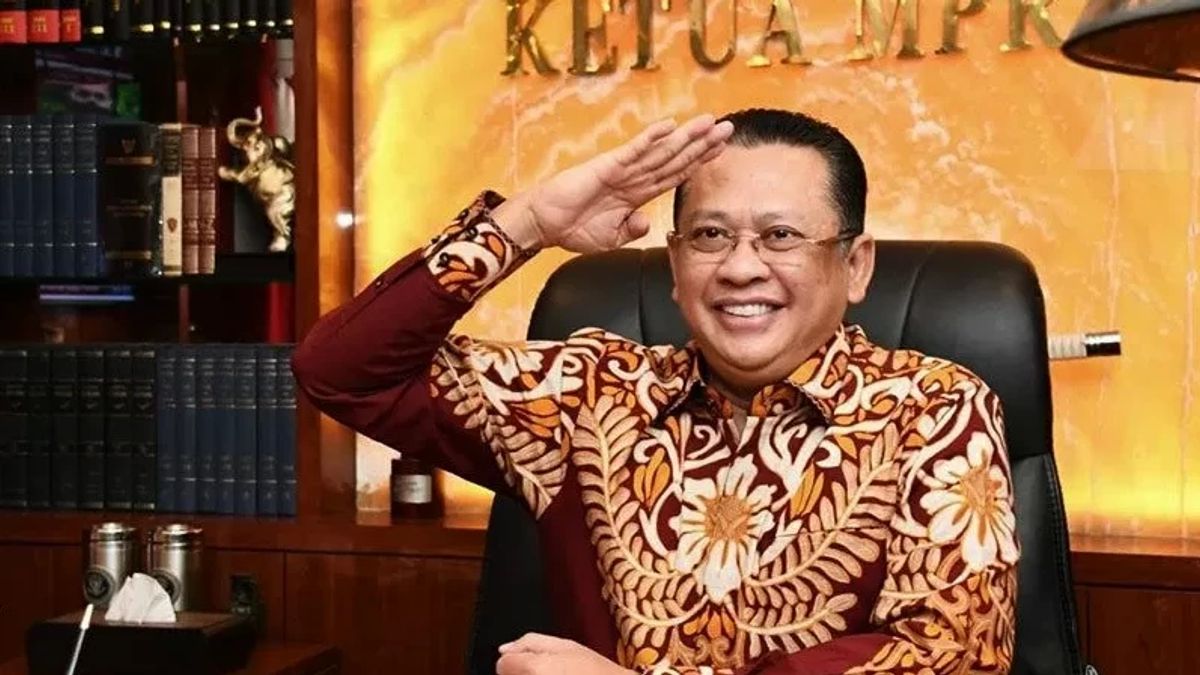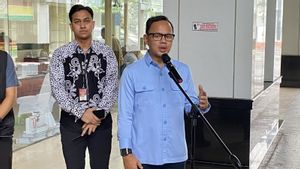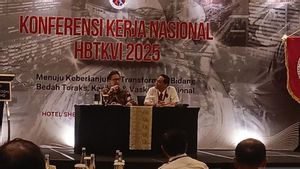JAKARTA - MPR Chairman Bambang Soesatyo or Bamsoet said the MPR could not initiate the amendment process to the 1945 Constitution. According to him, the MPR was only limited to responding to discourses or proposed amendments that had already been submitted and met the administrative and substance requirements.
"The discourse on limited amendments to the 1945 Constitution of the Republic of Indonesia, which was originally intended to bring back the Basic Principles of State Policy, has developed and continues to be 'fried' into a wider issue. One of them is related to the discourse on extending the term of office of the president, whereas President Joko Widodo said he would obey the constitution," said Bamsoet in his statement in Jakarta, Thursday, March 31.
He explained, if there are still parties who ask for an additional term of office of the president, then they must go through the constitutional route by applying for an amendment to the 1945 Constitution first.
According to him, the stages of the amendment to the 1945 Constitution of the Republic of Indonesia are regulated in Article 37 of the 1945 Constitution and Article 101 to Article 109 of the MPR RI Regulation Number 1 of 2019 concerning the Order of the RI MPR.
"The position of the MPR will always be perpendicular to the principle of the rule of law in accordance with the provisions of Article 1 Paragraph 3 of the 1945 Constitution of the Republic of Indonesia, and comply with the applicable laws and regulations," he said.
However, according to Bamsoet, when referring to Article 37 of the 1945 Constitution of the Republic of Indonesia, the opportunity for amendments is open, and it is even regulated in detail on the procedures for proposing amendments to the articles of the 1945 Constitution of the Republic of Indonesia.
According to him, this is similar to the changes that occurred several times in the 1945 Constitution of the Republic of Indonesia after the reformation, from the original text through the first amendment to the fourth amendment which was carried out at the General Assembly of the People's Consultative Assembly on August 1-11, 2002.
"The latest amendment includes 19 articles consisting of 31 provisions and one item that was abolished. The amendment process to the Constitution needs to be initiated by the presence of consensus and commitment, especially from elements of Political Parties, considering that the majority of MPR Members (575 out of 711, or 80.8 percent) are DPR members who come from political parties," he said, citing Antara.
He explained that requests for amendments to the 1945 Constitution of the Republic of Indonesia can be submitted to the leadership of the MPR by at least 1/3 of the total members of the MPR (237 members).
According to him, the change proposal cannot be changed, replaced, and/or withdrawn after 3 x 24 hours since the proposal was submitted to the MPR leadership.
"Within a maximum period of 30 days, the MPR leadership will hold a meeting with the Faction Leaders and the DPD Group Leaders to examine the proposed changes," he said.
Bamsoet said that in the next process the MPR Leadership held a Joint Meeting to inform and decide on the follow-up to the proposed changes.
According to him, if a proposal is rejected, for example, does not meet the requirements for the number of proposers, a written explanation must be given to the proposer.
However, he said if the proposal is accepted, the MPR leadership must hold an MPR Plenary Session within a maximum period of 60 days.
"All MPR members receive a copy of the proposed amendment which is declared to have met these requirements, no later than 14 days before the MPR Plenary Session is held," he said.
Bamsoet explained that in the MPR Plenary Session, at least three agendas were carried out, namely first, the proposer explained the proposed proposal and the reasons.
Second, according to him, the DPD Fractions and Groups provide a general view of the proposed changes, and third, the formation of an Ad Hoc Committee to review the proposal within the agreed timeframe.
"In the next MPR Plenary Session, which is attended by at least 2/3 of the MPR (474 members), the Ad Hoc Committee conveys the results of the study. Furthermore, the DPD faction and group provide a general view of the results of the study," he said.
According to him, the decision to amend articles of the Constitution is made with the approval of at least 50 percent plus 1 member from all members of the MPR, namely 357 members of the MPR.
He said, if the proposal does not get approval from a minimum of 50 percent plus 1 MPR member, the proposal is rejected and the proposal cannot be re-submitted during the same membership period.
In addition, according to him, the proposal for amendments cannot be submitted within 6 months before the end of the MPR membership period, meaning that the last deadline is March 31, 2024.
During the discussion, CSIS members who attended included Harry Tjan Silalahi, Jusuf Wanandi, Clara Joewono, J. Kristiadi, Yose Rizal Damuri, Medelina Hendytio, Shafiah Muhibat, Arya Fernandes, Noory Okhtariza, NICkey Fahrizal, and Edbert Gani Suryahudaya.
Meanwhile, the SOKSI administrators who attended included General Chairperson Ahmadi Noor Supit, Daily Chair AA Bagus Adhi Mahendra Putera, Secretary General M. Misbakhun, General Treasurer Robert Cardinal, Chairman of the Board of Experts Bomer Pasaribu, Deputy General Chairperson Fatahillah Ramli, Deputy General Chairperson Freddy Latumahina, and Deputy Secretary General Junaidi Elvis.
The English, Chinese, Japanese, Arabic, and French versions are automatically generated by the AI. So there may still be inaccuracies in translating, please always see Indonesian as our main language. (system supported by DigitalSiber.id)













